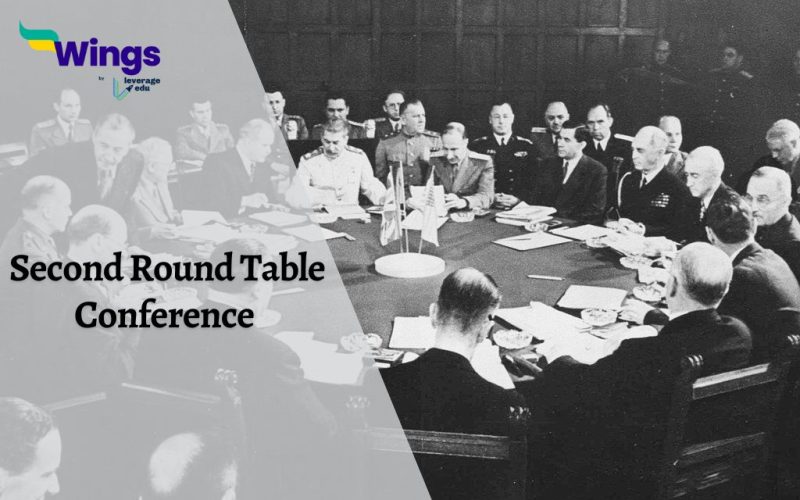In London, England, from the 7th of September, 1931 to the 1st of December, 1931, a consequential political event, the Second Round Table Conference was held. At that time, the British government had called it to negotiate constitutional reforms for India in reply to the urge for a substantial self-government. Since the First Round Table Conference in 1930 fell through as it was boycotted by the Indian National Congress, the Second Round Table Conference was put into action. Let us explore in this blog about the Second Round Table Conference.
Table of Contents [show]
Noteworthy Facts about the Second Round Table Conference
- The Second Round Table Conference was held in England, London from the 7th of September to the 1st of December, 1931.
- The Second Round Table Conference was called to deliberate upon the constitutional reforms for India in reply to the urge for substantial self-government.
- Mahatma Gandhi was nominated as its sole representative by the Indian National Congress.
- The representatives from numerous Indian communities and British officials attended the Second Round Table Conference.
- The problems of bringing diversified groups together and reaching a consensus on critical issues was highlighted during the Conference.
Must Read – India’s Journey to Independence from 1857 to 1947
NEWS ON AIR OFFICIAL
Participants of the Second Round Table Conference
Here is a list of the Second Round Table Conference participants and their representations.
Indian States’ Representatives
- Maharaja of Baroda
- Maharaja Of Darbhanga
- Maharao of Kutch
- Rana of Dholpur
- Maharaja of Jammu and Kashmir
- Chief Sahib of Sangli
British-Indian Representatives
| Government of India | C. P. Ramaswami Iyer (representative of the Government of British India) Narendra Nath LawM. Ramachandra Rao |
| Indian National Congress | Mahatma Gandhi (sole representative) |
| Muslims | Aga Khan III (representative of the Muslim League)Muhammad Ali Jinnah |
| Hindus | B. S. Moonje (leader of Hindu Mahasabha) |
| Liberals | C. Y. Chintamani |
| Depressed Classes | B. R. Ambedkar,Rettamalai Srinivasan |
| Women | Sarojini Naidu |
| Labour Class | N. M. Joshi |
| Sikhs | Sardar Ujjal Singh |
British Representatives
- PM of Britain – James Ramsay MacDonald
- Delegates from various political parties of Britain
Also Read – Salt Satyagraha Movement: Definition, Causes, Effects
The Proceedings of the Second Round Table Conference
- The Second Round Table Conference was divided into sub-committees, which discussed various issues related to
-the responsibility of the executive to the legislature and
-a separate Electorate for the Untouchables as demanded by Dr. B. R. Ambedkar.
- The reports of the sub-committees appointed during the Second Round Table Conference were heard and that formed the basis of discussions.
- The Indian delegates tried to push through some progressive provisions, which were dismissed.
- Due to a lack of agreement among the multiple delegate groups it meant no substantial results regarding India’s constitutional future.
- With Ramsay MacDonald’s undertaking to produce a Communal Award for minority representation, the Second Round Table Conference ended.
The Important Events of the Second Round Table Conference
- The British Government had then recognised the significance of the Congress Party’s participation in the Round Table Conferences for constructive reform enactment and conveyed hope that the Indian National Congress leaders would be present at the Second Round Table Conference.
- The Conference had put forth the labouriousness of the culmination of diverse groups together and then coming to a consensus on the critical issues.
- Mahatma Gandhi was the sole representative of the Indian National Conference.
- Mahatma Gandhi had announced that he would only work on behalf of the Harijans.
- Britain went into a financial crisis during the conference.
Also Read –Indian National Movement: Timeline for UPSC, PDF
The Outcomes of the Second Round Table Conference
- There were no substantial results regarding India’s constitutional future, since there was a lot of disagreements among the various delegate groups.
- The Second Conference was also deemed a failure due to the disagreements among all the participants.
- Though the Conference did not achieve all of its goals, it did lay the preparations for future discussions and contributed significantly to the Independence process of India.
QUIZ
Results
#1. Who was the sole representative of the Indian National Congress in the Second Round Table Conference?
#2. In which of the following countries was the Second Round Table Conference held in 1931?
#3. In which months was the Second Round Table Conference held?
Relevant Blogs
| Lord Lansdowne | Lord Irwin |
| Lord Lytton | Lord Chelmsford |
| The Government of India Act 1919 | Civil Disobedience Movement |
| Morley-Minto Reforms | Gandhi Irwin Pact (1931) |
| Bengal Partition | Chalukya Dynasty |
We hope you liked what you read. If you want to read more articles like this you can visit our general knowledge page on Indian History!
 One app for all your study abroad needs
One app for all your study abroad needs


















 45,000+ students trusted us with their dreams. Take the first step today!
45,000+ students trusted us with their dreams. Take the first step today!
